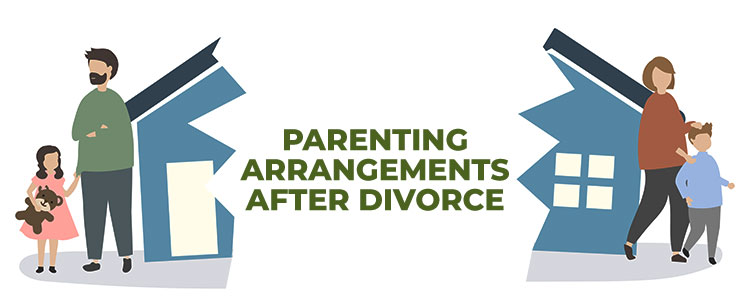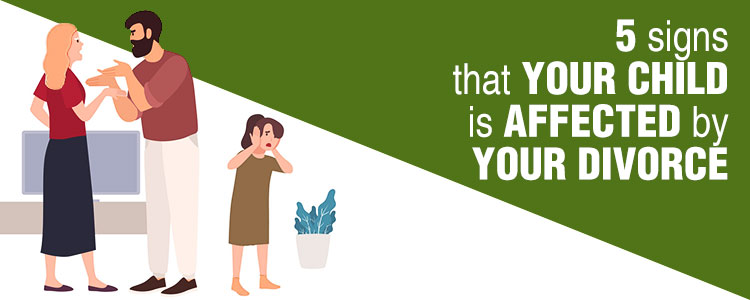
Resource Hub – Articles/Blog
Parenting Arrangements after Divorce

Divorce is painful for everyone concerned, especially children. During this challenging period, children need love, support and contact with both parents.
Creating certainty about the future is crucial for children when their parents separate. Parents coming to a mutual agreement about parenting arrangements can help to provide clarity and certainty.
When parents agree
Following separation, parents may agree on a parenting arrangement that works for them and the children. The agreement should focus on providing for the needs of the children and may include financial arrangements.
A parenting arrangement can be agreed orally, in writing or put into a formal court order known as ‘consent orders’ (which requires an application to the court but does not require a court appearance).
When parents don’t agree
If parents can’t agree on parenting arrangements, they can apply to the court for a parenting order. Usually (except in the case of family violence and other specific circumstances), parents are not permitted to apply for a parenting court order until they have first attempted family dispute resolution (mediation).
The court’s primary concern will be to protect the children from psychological or physical harm. The court will address this before deciding about parenting arrangements.
The Australian Government has published a book to help develop parenting plans. This resource can help prepare clear, practical parenting arrangements that are focused on what’s best for the children.
What to consider when creating a parenting agreement?
When making parenting arrangements, parents may consider a range of issues including:
- The capacity of each parent to provide day-to-day care?
- The age of the children?
- The arrangements for the children before and after school and during school holidays?
- Will the children spend their time with other significant people in their lives, like grandparents or other relatives?
- The children’s educational needs?
- Any cultural considerations?
- The special needs of the children, including educational and medical?
- The children’s wishes, having regard to their age and stage of development?
- Other practical considerations such as transport and accommodation expenses?
While a routine may be best for your children overall, flexibility is likely to be an essential ingredient of a parenting agreement.
Relocating with children
If you are thinking of relocating with your children at a distance that would dramatically affect the time they spend with the other parent, you will need to come to an agreement with the other parent. If agreement is not reached, an application to the family law courts seeking permission to relocate the children will be required.
The proposed relocation destination may involve moving intrastate, interstate or overseas. Consider how the relocation will affect the children’s relationship with the other parent and ask yourself the question ‘Would the move be in the children’s best interests?’ – the court will ask the same question.
What’s next?
Consider what is best for your children’s short-term and long-term wellbeing.
Work out what concerns need to be addressed in your parenting arrangement.
Decide whether you want the parenting agreement to be an informal oral or written agreement, a parenting plan signed and dated by both parents or a court order obtained by consent or by order of the court (judge made order).
Contact an accredited family law specialist or family dispute resolution practitioner to obtain the advice that you need to resolve your post-separation parenting issues. Our specialist solicitors and family dispute attorneys are able to help you with your parental rights.
IAFL Global Comparison of LGBT Laws
The International Academy of Family Lawyers, of which Vanessa Mathews is a Fellow, has published a global survey of Lesbian Gay Bisexual Transgender laws (LGBT laws), the results of which can be found here https://www.iafl.com/media/5336/2019-iafl-lgbt-survey.pdf.
The IAFL LGBT Committee stated ‘Laws affecting LGBT people vary greatly by country or jurisdiction. There are now 28 jurisdictions that accept same sex marriage, however gay sex remains illegal in many jurisdictions with the death penalty still applying in 14.
The International Academy of Family Lawyers (“IAFL”) supports all efforts towards full equality of the LGBT community throughout the world and the end to rules that unfairly discriminate against such individuals and, in many countries, criminalize countless couples because of the ones they love. There remains a lot of work to be done.
The work done by some fellows of the IAFL is having a real impact and changing for the better the lives of LGBT people. The LGBT Committee of the IAFL commissioned this survey to capitalize on the knowledge and expertise of some members for the benefit of the IAFL as a whole and the LGBT community.
The individual submissions in this survey are the work of fellows of the IAFL who have kindly donated their time and expertise to answer the same questions as set out below. Each of the contributor’s names and contact details are included.
The LGBT Committee intends that this should be a living resource. We are asking those who have already kindly donated their time to keep us informed as laws change in their jurisdictions. We have detailed submissions from 46 jurisdictions, however, there remains a good number of jurisdictions not covered where the IAFL has fellows. If your jurisdiction is not covered and you feel able to complete a survey, please get in touch with the IAFL.’
Congratulations to the IAFL LGBT committee members for preparing such a comprehensive review of comparative laws.
5 signs that your child is affected by your divorce

Separation and divorce hurt. There’s no getting around that fact.
Without special care and attention, children can be the unintended victims of separation and divorce. For them, their parent’s separation can open a floodgate of emotions, which, for children of any age can be difficult to process and express.
Many of the parents we speak with of course to want to minimise the impact of their divorce on their children, but do not always know what signs to look for. So how can you identify the signs that your child may be being adversely affected by your separation and divorce?
Although every child is unique, there are some clear signs to look out for:
Your child is feeling sad and cries more than usual
Your child could be sad and cry a lot. It might be more difficult than usual to comfort them. They might cry for no reason or react disproportionately to that which to you seem to be minor issues.
The things they cry over may have nothing to do with the separation and divorce however due to difficulty in understanding and accepting the changes to their family, their ability to deal with other issues may be diminished and they can become easily upset.
Your child gets separation anxiety
You or your former partner might find that your children don’t want to leave your side, or that they want to stay with the other parent and resist going with the other parent.
Separation anxiety for children is common when parents separate. Their anxiety is a result of the significant changes they are experiencing and staying close to one or both parents are their way of managing it.
Your child is overly emotional and gets angry
When parents separate, it may cause the children to feel uncertain, insecure, worried or anxious. The complex emotions they feel and their inability to express their feelings may be ‘acted out’, such as angry verbal or physical outbursts or uncooperative behavior. Helping your children to express those complex emotions can help to release the anger and improve their well-being and anxiety.
Your child is withdrawn and has lost interest in activities
The stress of parents separating can result in children withdrawing into themselves and refusing to engage in activities they have enjoyed in the past. Some children stop hanging out with their friends, preferring to spend all their time in their room, keeping a distance from their family and doing things by themselves.
Decline in school performance
When children are tackling a stressful situation at home, it can directly impact on their performance at school. The stress at home takes so much of their attention and energy and they may have difficulty focusing in class.
At home, they may be anxious and distracted, unable to focus on homework, negatively affecting their academic performance.
The dip in academic performance can result in further anxiety for the child; they feel terrible about falling behind, compounding the situation with another stressful situation. If your child is struggling at school after separation, it is a good idea to inform the school about the situation at home.
Conclusion
Separated parents feel responsible for their child’s suffering. Parents must remain united in their commitment to ensuring that any adverse impact on their children is kept to a minimum, and, if any are identified they are immediately met with an appropriate united response. The conflict between parents will certainly exacerbate the impact on the children, potentially dramatically.
If you detect a dramatic change in your children’s behavior and emotions, and your efforts to support them aren’t helping, please seek urgent help. Early intervention can help both you and your children to get the support required to see you through this difficult time.
Recommended Post: Family Violence and Children at Risk
Ten Tips For The Holidays
by Dr. Robin Deutsch, Psychologist
1. Have a very specific plan for the holidays so there is no opportunity for confusion or conflict. Parents may alternate or split holidays, but when there is disagreement about this plan, consider the longer view of alternating holidays by even and odd years. Holidays are often a time of heightened emotions, and the reality of the loss associated with separation or divorce is no more apparent than when parents must spend a holiday without their children or without old traditions.
2. Try to continue traditions of the past for the children. If they are accustomed to spending Christmas Eve with one extended family, try to continue that tradition, if not every year then in alternate years. Parents should consider maintaining some of the family traditions the first year after the separation, and alternating beginning the following year.
3. If you can continue some traditions together, make them clear, attending to details of who, what, where, when, and how. Some families are able to be together without conflict arising, but parents often have different expectations about the experience itself, as well as the amount of time they will be together. The most important thing for the children is that they do not experience conflict between their parents.
4. Create new traditions that feel special to the children and family. This is an opportunity for the new family configuration to establish new traditions for the holidays including creation of a special holiday celebration or experience on a day other than the actual holiday. It is also an opportunity for the adult who does not have the children, to establish new practices such as time with friends, volunteering, movie days, and travel.
5. Think long-term-what do you want your children to remember about holidays when they have their own children? For children, holidays are magical. It is often the little rituals and practices that are most memorable, such as baking a pie, playing a game or lighting the fire.
6. Remember, children’s memories include all senses what they saw, heard, smelled, tasted and touched. To the extent possible, create a memory that involves each of these senses and describe it, e.g. we always listen to this music, eat cranberry sauce, watch this movie, read this book, take this walk, and cut these branches. Do not allow conflict to enter into these memories.
7. Self-care is very important. Life for the adults has significantly changed. Find new ways to care for yourself, e.g. exercise, friends, books, movies, clubs, martial arts, dance, classes, activities that bring new energy and attention. You want to rejuvenate yourself and refocus on something to help you reconstitute yourself in your new life.
8. Keep your expectations small and be flexible. Focus on one thing that matters most to you during the holidays, e.g. some sense of connection to your family, having sometime with extended family or close friends, creating a new tradition, continuing a tradition. Your holiday time will not be the same, but you can decide that you will have one small goal that you will work toward creating or preserving. Holidays may be accompanied by unmet needs and dashed hopes. By thinking small you can manage disappointment and decrease stress.
9. Though you, the parent, may feel disoriented and lost in the changed family, keep your focus on the children and the new family constellations. Make the holidays about your children, which means helping them to feel good about spending holiday time with the other parent.
10. In ten years or twenty years, what do you want to see when you look back on these years of change? From that long view you can highlight the tone and experience of these transformed holidays. Remember, children who find holidays stressful because of the conflict between their parents, have terrible memories as adults of holidays and of special family moments. It is in your hands to create fond, pleasant memories for your children. They can be traditional or not, but the message is that you and our family are important and we find ways to celebrate and enjoy holidays.
Full attribution to Dr. Robin Deutsch provides consultation, mediation, parenting coordination and expert witness services in Wellesley, MA. She developed and was the director of the Center of Excellence for Children, Families and the Law at the William James College. Previously she was an Associate Clinical Professor of Psychology at Harvard Medical School. Dr. Deutsch was the co-chair of the AFCC Child Consultant Task Force. She served on both the AFCC and APA task forces that developed Guidelines for Parenting Coordination, the AFCC task force for Guidelines for Examining Intimate Partner Violence and the AFCC task force for Court-Involved Therapists. She is the past president of the Massachusetts chapter of AFCC, past president of the AFCC, and former Chair of the APA Ethics Committee.
Why is the divorce rate declining?

By 2016 the marriage rate in Australia had declined from 9.3 marriages per 1,000 residents to 4.9 in 2016.
The divorce rate has also been in steady decline since its height in 1976 (for obvious reasons) to 1.9 in 2016.
I wonder if the reasons for the declines set out in this American study – that who gets divorced is a function of who gets married – are applicable to the Australian social context?
https://www.theatlantic.com/family/archive/2018/09/millennials-divorce-baby-boomers/571282/
‘Alienation? Myths, Complexities and Possibilities … ‘

Dear Friends
Last weekend I attended the AFCC Australian Chapter conference in Adelaide.
The conference topic was ‘Alienation? Myths, complexities and possibilities …’.
The caliber of the papers was excellent.
I was particularly interested in the workshop offered by Dr. Philip Stahl, Psychologist, on domestic violence differentiation, personality disorders and unconscious bias.
Also of great interest was the current research on high conflict separations, alienation and children resisting contact with parents.
Early identification and intervention are the keys to avoiding the escalation of ‘mere conflict’ into alienation and the devastating impact on children (regardless of age).
We heard from our local well-known Psychologists Dr. Jenni Neoh and Ms. Lisa Bottomley in particular about their respective intervention programs for complex family matters.
We often work with families facing experiencing particular difficulty with their post-separation parenting – with young and old children. We will be recommending Jenni and Lisa’s very special approaches to these clients in the hope of achieving an early and effective resolution.
The AFCC website provides a wealth of excellent resources, including conference papers http://afccnet.org.au/ . You may like to consider becoming a member.
We continue to offer a free initial telephone consultation to your clients in need of family law advice – they simply need to call us on 1300 635 529 or email [email protected] to book a time for one of our family law specialists to speak with them.
And remember, we’re always happy to help you out with any questions you may have. Stay in touch,
Vanessa and the Team at Mathews Family Law & Mediation Specialists
Re-partnering After Separation, Divorce
Second marriages, partnerships, step-families present challenges, new opportunities after legal separation, divorce

Relationships Australia has prepared this informative summary about the challenges and complications of re-partnering after Legal separation, or divorce.
In second partnerships, couples are often more aware of the difficulties in establishing a successful relationship and are more committed to making the marriage work.
Both second marriages and step-families have to overcome some difficult hurdles. These hurdles can present significant challenges to the couple in their relationship as partners and as parents.
Unfortunately, many second marriages and step-families, despite their commitment to making things work, fail to get over these hurdles.
This page outlines some of the challenges and complications of re-partnering and step-families.
The decision to re-marry or re-partner
Before you re-marry or re-partner, you should consider the following questions:
- When?
- Why?
- To Whom?
Listen to any doubts. If necessary, wait a little longer
When?
The simple answer is after you have fully come to terms with the end of your previous relationship. This is particularly important if you did not want the first marriage to end, and had to deal with the pain of leaving or being left by your previous partner. It takes longer than many people expect to get over the end of a long-term relationship, even if you were unhappy and felt that the end was inevitable.
Some studies suggest many people take at least two years to adjust to the end of a long-term relationship. There are many exceptions to this. Some people take longer, others adjust more rapidly. Ask yourself:
- Do I find myself thinking about my ex-partner and do these thoughts still arouse strong feelings such as anger and resentment?
- Have I adjusted to living alone again?
- Have I regained a sense of self-confidence?
- Can I look back on that relationship and recognise some of the things that contributed to its breakdown?
In other words, am I emotionally free to re-partner? Can I put all my emotional energy into this new relationship without allowing my feelings about my previous relationship to get in the way?
Just as you cannot re-marry until you are legally free to do so, being emotionally free to re-marry is also important.
Why?
Unfortunately, this question is often overlooked. Are you thinking of re-marrying or re-partnering because you want to be with someone whom you love or do you want to re-marry or re-partner for the sake of being in a relationship or to provide a two-parent home for your children? Being alone is not easy after being married or in a long-term relationship, especially if you have children living with you. However, moving too rapidly into a new relationship can create a new set of problems.
To whom?
Past experiences influence our choice of partners. This is especially true of a second marriage. Be realistic about what worked and what didn’t work in your first marriage when making a decision about a new partner. Learn from that experience to clarify what sort of partner you want.
Being in love is not enough to make a relationship work especially once the initial excitement has worn off.
The following organizations offer separation, and divorce counselling:
Family Relationships Centre: http://www.familyrelationships.gov.au/searchpages/searchpage.aspx?KEYWORD=frc%20not%20pop&RESOURCETYPES=Service
Relationships Australia: http://www.relationships.org.au/what-we-do/services/counselling
CatholicCare: http://www.ccam.org.au/
Family Mediation Centre: https://www.fmc.org.au/marriage-counselling.php?gclid=Cj0KEQiAqK-zBRC2zaXc8MOiwfIBEiQAXPHrXsvDPeRotm4nM6DHg4zIk5QIa_fiidlbpIzCf9gbUlYaAoXl8P8HAQ
Separation and Divorce at Christmas
The following informative article about coping with separation and divorce at Christmas was published by Relationships Australia www.relationships.org.au
Resources
For some people, Christmas can be the most stressful time of the year. People can feel increased financial pressure from the costs of buying gifts, entertaining and holidays, and there can be increased strain from spending time with family members. For those people with complex family situations, such as separated families, Christmas time can present even greater challenges. Stress, anxiety and depression are common feelings over the holiday period.
There are some practical things you can do to prevent stress at Christmas
- If someone close to you has recently died or you are unable to be with your family and friends, acknowledge your feelings. It’s normal to feel sadness and grief and you can’t force yourself to be happy just because it’s the holiday season.
- If you feel lonely or isolated, seek out community, religious or other social events. They can offer support and companionship. Volunteering your time to help others also is a good way to lift your spirits and broaden your friendships.
- Sometimes expectations around family gatherings may make you uncomfortable or stressed. As families change and grow, traditions and rituals often change as well. Choose a few to hold on to, and be open to creating new ones.
- Try to accept family members and friends as they are. Set aside grievances until a more appropriate time for discussion and be understanding if others get upset when something goes awry. People under stress often ‘self-medicate’ with alcohol, cigarettes and other drugs. Try to remember that drugs can’t solve problems or alleviate stress in the long term.
- Stick to a budget. Before you go gift and food shopping, decide how much money you can afford to spend and then stick to your budget. If you have a large circle of extended family or friends to buy gifts for you might be able to suggest a change in the way your family and friends give presents. For example:
- Buy presents only for the children.
- Have a Kris Kringle, where everyone draws a name out of a hat and buys a present only for that person.
- Set a limit on the cost of presents for each person
- Plan ahead. Set aside specific days for shopping, baking, visiting friends and other activities. If you plan your menus and activities you may avoid the stress associated with last-minute or forgotten tasks.
- Learn to say no. Saying yes when you should say no can leave you feeling resentful and overwhelmed. Most friends and colleagues will understand if you can’t participate in every project or activity. If it’s not possible to say no when your boss asks you to work overtime, try to remove something else from your agenda to make up for the lost time.
- Don’t abandon healthy habits. Overindulgence can add to your stress and guilt. Try these suggestions:
- Have a healthy snack before holiday parties so that you don’t go overboard on sweets, cheese or drinks.
- Get plenty of sleep and regular exercise.
- Take time out for yourself. Spending just 15 minutes alone, without distractions, may refresh you enough to handle everything you need to do. Find something that reduces stress by clearing your mind, slowing your breathing and restoring inner calm. Some options may include:
- Taking a walk at night and stargazing.
- Listening to soothing music.
- Getting a massage.
- Reading a book.
Where to get help with separation and divorce at Christmas
If you need professional medical help, talk to your doctor or your local community health center
If you would like to talk to someone immediately, you can contact:
- Lifeline – a free crisis telephone counselling service www.lifeline.org.au or call 13 11 14
- Monoline Australia – a counselling service and resources for men in family crisis www.mensline.org.au or call 1300 78 99 78
- Family Relationships Online www.familyrelationships.gov.au
- Family Relationships Advice Line 1300 364 277
You can also access counselling and support services in your state and territory through the Relationships Australia website www.relationships.org.au or by calling 1300 364 277
If you feel anxious or depressed, information and resources are available at www.beyondblue.org.au
If you are a young person, or the parent or career of a young person with mental health problems, support is available at www.headspace.org.au
If you are caring for someone you may find useful information and resources at www.carersaustralia.com.au
If you, or someone you know is experiencing family violence you can contact 1800 RESPECT 24 hours a day 1800 737 732 or www.1800respect.org.au
If you need help with budgeting, you can find a financial counsellor in your local area by accessing
http://www.financialcounsellingaustralia.org.au/Corporate/Find-a-Counsellor
You can also talk to a phone financial counsellor from anywhere in Australia by ringing 1800 007 007 (minimum opening hours are 9.30 am – 4.30 pm Monday to Friday).
If you are having ongoing conflict or disagreements with your children, siblings, parents or extended family, you can seek the professional assistance of a counsellor or mediator, for example see:
There are many volunteering opportunities in Australia and the websites below can give you some ideas about the various ways you can broaden your social networks and contribute to your community:
http://www.volunteeringaustralia.org/
If you live near others who are likely to feel isolated, lonely or vulnerable around Christmas, check in with them, and perhaps include them in your own festivities. For information and ideas about what other people do for their neighbors see the Neighbor day website, Australia’s annual celebration of community:
Sources: http://www.mayoclinic.org/healthy-living/stress-management/in-depth/stress/art-20047544;
Using Credit Cards after Separation and Divorce
There are a number of practical steps to take regarding your credit cards after you separate.

- Write down the date you actually separated. Even better, send an email to your spouse or partner stating clearly that “on May 1, 2014, we officially separated”. This date may become important later on when and if debts need to be divided. If your spouse incurred the debt after the date of separation, the court may hold him responsible for it when dividing up property.
- If possible, get rid of joint credit cards. If you are the primary cardholder – great! You can lower the credit limit, which prevents your spouse from going crazy with the card and running up more debt. The best option is to cancel the card altogether if the company allows it. If your name is on the account, no matter who runs up the debt, you are also responsible.
- Make sure to print out all of your balances from your credit card account, including all purchases and payments. Even if you are held accountable, when the time comes to draw up a property settlement, you may be able to have these listed as your spouse’s debt and deducted from his share of the assets.
- Discuss with your lawyer signing a legal separation agreement. Written correctly, this may limit your liability for your spouses’ debts, including credit card debts. One of our divorce law lawyers can provide you with specialist advice. Speak with a family law attorney at Mathews Family Law today.
Vanessa Mathews Interview with Herald-Sun. Ashley Madison – Impact on Divorce in Australia?
Vanessa Mathews was asked whether she believed the Ashley Madison scandal would result in a ‘surge’ in divorces?
Click on the link to read the article
http://www.couriermail.com.au/news/ashley-madison-hack-reveals-more-than-213000-melburnians/story-fnu4vh3q-1227492328816
online-divorce.com.au
Are you wishing to apply for divorce?
Mathews Family Law provides a unique online divorce application service.
Simply submit the easy-to-complete application form and one of our team of specialist solicitors and divorce law lawyers will personally manage your divorce for you.
Hassle-free.
Easy.
Cheap.
Australia wide.
Let us do the worrying for you.
Federal Circuit Court of Australia: http://www.federalcircuitcourt.gov.au/wps/wcm/connect/fccweb/home











